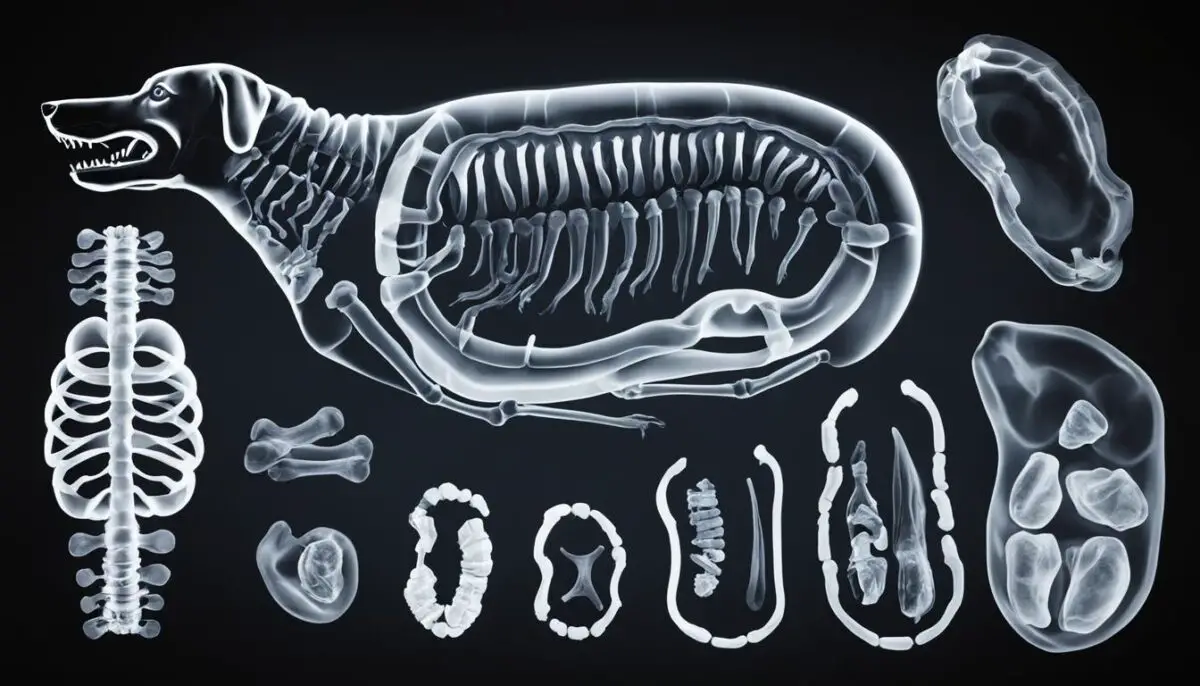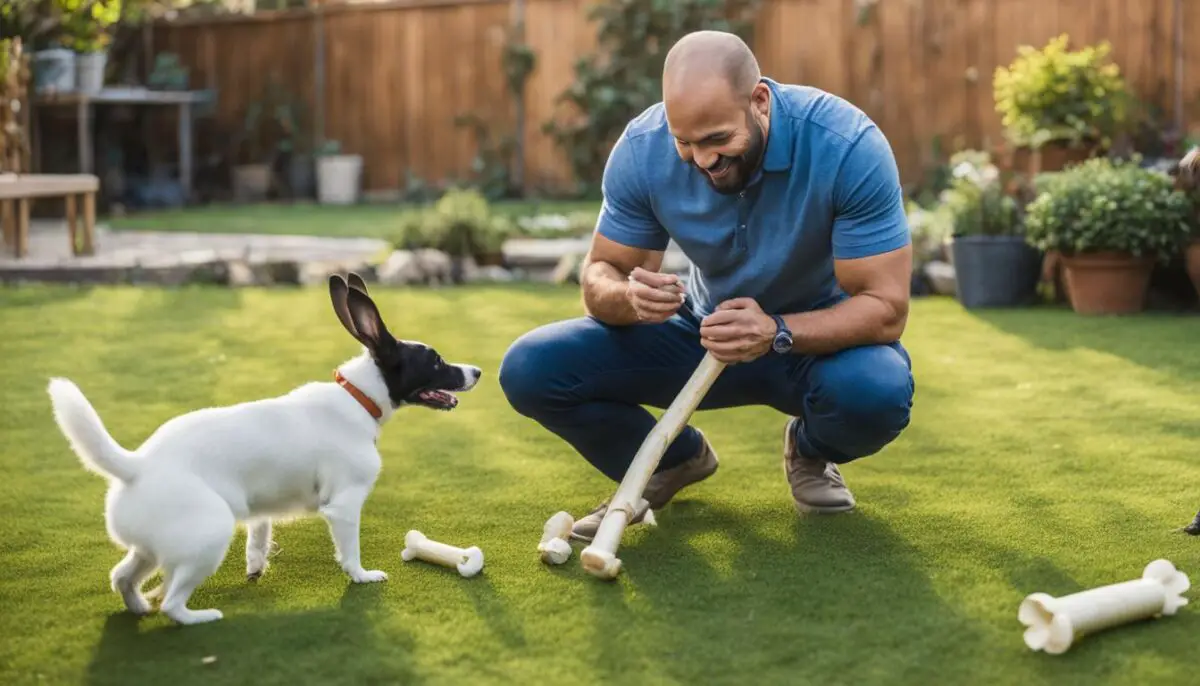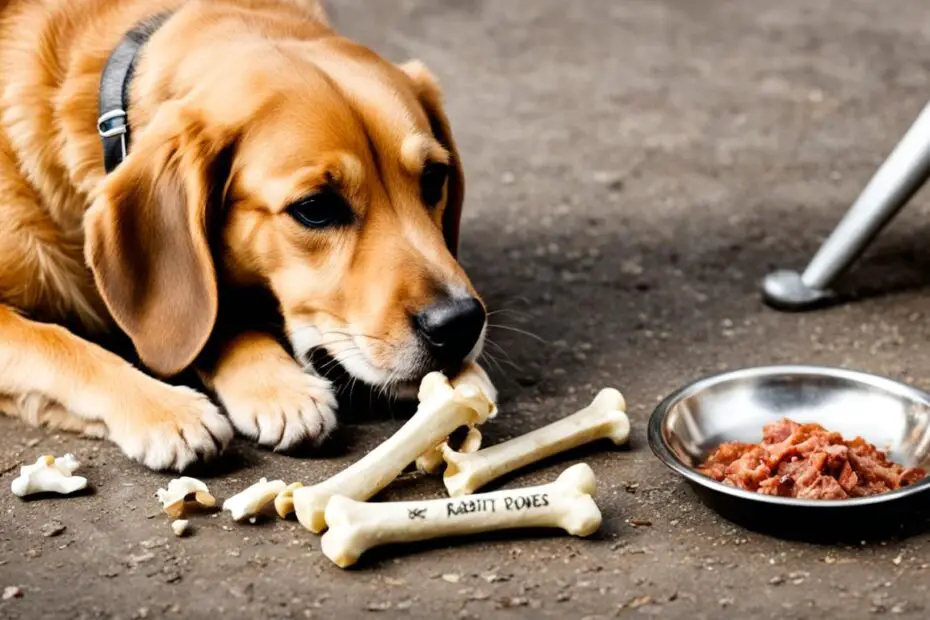As dog owners, we often find ourselves wondering if our furry companions can enjoy the same foods we do. Rabbit bones may come to mind as a potential treat for our dogs, but before you toss your pup a bone, it’s important to understand the potential risks involved.
Dogs have a natural instinct to chew, and bones can provide them with mental stimulation and dental benefits. However, when it comes to rabbit bones, caution is advised. While dogs can safely eat raw rabbit bones, there are still potential dangers to consider.
The safety of feeding bones to dogs is a topic of debate among pet owners and veterinarians. While some argue that it is natural for dogs to eat bones, others caution against the risks involved. It is important to make an informed decision based on your dog’s individual needs and health.
Key Takeaways:
- Feeding dogs rabbit bones can be risky due to potential dangers such as chipped teeth and choking.
- Supervision is crucial when allowing your dog to chew on bones to minimize the risk of injury.
- Choosing the right size and type of bone is important, considering your dog’s breed and chewing habits.
- Opt for raw bones instead of cooked bones, as cooked bones can easily break and cause harm.
- If you’re unsure about feeding bones to your dog, there are plenty of safe alternatives available.
By prioritizing your dog’s safety and understanding the risks involved, you can make the best decision when it comes to feeding rabbit bones to your furry friend. Always consult with your veterinarian for personalized advice tailored to your dog’s specific needs.
Dangers of Feeding Bones to Dogs
Feeding bones to dogs, including rabbit bones, can pose several dangers. It is essential for dog owners to be aware of the potential risks associated with this practice. Some of the primary dangers of dogs eating rabbit bones include:
- Risk of Chipped Teeth: Rabbit bones, especially if they are hard and dense, can cause dogs to chip or break their teeth while chewing on them. This can lead to pain, discomfort, and the need for dental treatment.
- Potential for Bone Shard Injuries: When dogs chew on bones, particularly if they are cooked or brittle, there is a risk of bone shards splintering and getting stuck in the mouth or throat. These fragments can cause cuts, abrasions, or even internal injuries if swallowed.
- Choking Hazard: Dogs can be at risk of choking on small bone pieces or by biting off a piece that is too large to swallow. This can be a life-threatening emergency requiring immediate intervention.
- Intestinal Blockage: Swallowing bone fragments can lead to intestinal blockage or obstruction. This condition requires medical attention and may necessitate surgery to remove the blockage.
- Blocked Stomach: Ingesting large quantities of bones, including rabbit bones, can lead to a blocked stomach. This can cause severe discomfort, pain, and potentially life-threatening complications.
- Risk of Food Poisoning: Rabbit bones, especially if they are not stored or handled properly, can carry bacteria such as Salmonella or Campylobacter. Consuming contaminated bones can result in food poisoning and digestive issues for dogs.
- Pancreatitis: Feeding dogs high-fat bones, such as cooked bones, can trigger pancreatitis, a condition characterized by inflammation of the pancreas. Pancreatitis can cause severe abdominal pain, vomiting, and diarrhea in dogs.
To visually illustrate the potential dangers of feeding bones to dogs, consider the following table:
| Concerns | Explanation |
|---|---|
| Chipped Teeth | Rabbit bones can cause dogs to chip or break their teeth while chewing. |
| Bone Shard Injuries | Bone fragments can splinter and cause cuts or internal injuries if swallowed. |
| Choking | Bone pieces can become lodged in the dog’s throat, leading to choking. |
| Intestinal Blockage | Swallowing bone fragments can result in a blockage in the dog’s intestines. |
| Blocked Stomach | Ingesting large quantities of bones can cause a blockage in the dog’s stomach. |
| Food Poisoning | Bones can carry bacteria, leading to food poisoning in dogs. |
| Pancreatitis | Feeding high-fat bones can trigger inflammation of the pancreas. |

It is crucial for dog owners to understand and mitigate these risks when considering feeding bones to their pets. It is recommended to avoid feeding cooked bones entirely, as they are more prone to splintering and causing harm. Instead, focus on safe alternatives that provide similar chewing satisfaction without the associated dangers. The next section will explore how to safely feed dogs bones or explore alternative options that can meet their chewing needs.
How Can I Safely Feed My Dog Bones?
If you decide to feed your dog bones, there are safety precautions you should take. The key is to ensure that the feeding process is safe and reduces any potential risks for your furry friend. Here are some safe feeding practices for dogs:
- Supervision: Always supervise your dog when they are chewing on bones to minimize the risk of injury. Dogs can get carried away or swallow bones that are too large, leading to choking or digestive issues.
- Size Matters: Choose bones that are the appropriate size for your dog, considering their breed and chewing habits. A bone that is too small can become a choking hazard, while one that is too large may pose a risk of broken teeth.
- Raw is Best: Opt for raw bones rather than cooked bones when feeding your dog. Cooked bones can splinter easily, causing harm to your dog’s mouth, throat, or digestive system.
- Alternatives to Bones: If you are unsure about feeding bones to your dog, there are alternative options that can also provide chewing satisfaction. Consider Nylabones, Kongs, or even carrots as safe alternatives to satisfy your dog’s instinctual need to chew.

Remember, the safety and well-being of your dog should always be your top priority. If you have any concerns or questions about feeding bones to your dog, it is always best to consult with your veterinarian for personalized advice.
Alternatives to Bones for Dogs
If you are not comfortable feeding bones to your dog, there are plenty of alternatives that can satisfy their chewing needs. These alternatives provide mental stimulation, help keep teeth clean, and fulfill a dog’s instinctual need to chew. Some popular alternatives to bones for dogs include:
- Nylabones
- Kongs
- Carrots
Nylabones are durable synthetic chew toys that come in a variety of shapes, sizes, and flavors. They are designed to withstand aggressive chewing and can help keep your dog entertained for hours. Additionally, Nylabones help promote good dental hygiene by reducing plaque and tartar buildup.
Kongs are another great alternative to bones. These rubber toys can be filled with treats or peanut butter, providing mental stimulation and keeping your dog engaged. Kongs are also durable and can withstand heavy chewing, making them suitable for even the most enthusiastic chewers.
If you prefer a natural option, carrots make an excellent substitute for bones. They are low in calories and high in fiber, making them a healthy choice for your dog. Carrots also provide a satisfying crunch and can help clean your dog’s teeth while they chew.
When choosing chew toys or alternatives to bones, it is important to consider your dog’s size and chewing style. Select toys that are appropriate for your dog’s breed and age to ensure their safety and enjoyment.
Offering your dog safe and engaging chewing options is essential for their overall well-being. By opting for alternatives to bones, you can provide your furry friend with a variety of enjoyable and dog-safe chewing experiences.
Conclusion
Feeding rabbit bones to dogs can be done safely, but it is crucial to be cautious and understand the risks involved. Close supervision is essential to prevent dogs from choking on bone fragments or injuring themselves while chewing. If you have any doubts or concerns about feeding bones to your dog, there are numerous alternatives available that can fulfill their chewing needs.
Ultimately, the decision to feed rabbit bones to your dog should be based on a careful evaluation of the potential dangers and your dog’s individual needs. It is always recommended to consult with your veterinarian to receive personalized advice tailored to your dog’s specific requirements.
By following safe feeding practices and staying informed about the risks, you can make an informed decision that prioritizes your dog’s health and well-being. Remember, your dog’s safety should always come first, and providing them with appropriate chew toys or alternatives is a responsible way to address their natural chewing instincts without compromising their health.
FAQ
Can dogs eat rabbit bones?
Dogs can eat raw rabbit bones, but they come with risks such as chipped teeth and choking. It is important to supervise dogs when they chew on bones.
Are rabbit bones safe for dogs?
Feeding bones to dogs, including rabbit bones, can pose several dangers such as chipped teeth, choking, intestinal blockage, and food poisoning. Cooked bones should always be avoided.
Should dogs eat rabbit bones?
The safety of feeding bones to dogs is a topic of debate. Some argue that it is natural for dogs to eat bones while others caution against the risks. It’s important to make an informed decision based on careful consideration of the potential dangers and your dog’s individual needs.
What are the risks of dogs eating rabbit bones?
The risks of dogs eating rabbit bones include the risk of chipped teeth, bone shards getting stuck in the mouth or throat, choking, intestinal blockage, blocked stomach, food poisoning, and pancreatitis.
How can I safely feed my dog bones?
If you decide to feed your dog bones, there are safety precautions you should take. Always supervise your dog when they are chewing on bones. Choose bones that are the appropriate size for your dog and opt for raw bones rather than cooked bones.
What are the alternatives to bones for dogs?
If you are not comfortable feeding bones to your dog, there are plenty of alternatives that can satisfy their chewing needs. These include Nylabones, Kongs, and carrots. It is important to choose chew toys that are safe and appropriate for your dog’s size and chewing style.


